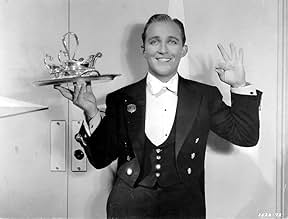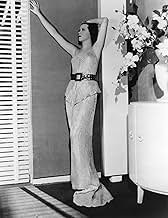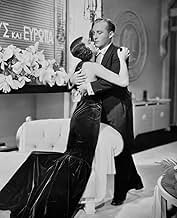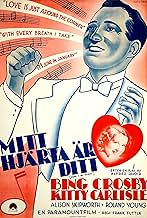A rich and famous singer disguises himself as a waiter in order to be near the woman he loves, a European princess.A rich and famous singer disguises himself as a waiter in order to be near the woman he loves, a European princess.A rich and famous singer disguises himself as a waiter in order to be near the woman he loves, a European princess.
Charles Arnt
- Higgins - Paul's Valet
- (as Charles E. Arnt)
Louise Carter
- Charity Lady
- (uncredited)
Lorinne Crawford
- Dancer
- (uncredited)
Mary Flynn
- Young Yacht Guest
- (uncredited)
Donald Gray
- Young Yacht Guest
- (uncredited)
Robert Klein
- Cloche
- (uncredited)
Cromwell McKechnie
- Paul's Secretary
- (uncredited)
Albert Petit
- Paul's Waiter
- (uncredited)
Featured reviews
A musical comedy from Paramount featuring one classically trained voice and one popular singer, set in Europe, built around a romance between an impoverished princess and a rich man posing as a waiter to be near her... this sounds to me exactly like the kind of movie that Paramount would have assigned to Maurice Chevalier, Jeanette MacDonald and director Ernst Lubitsch during the early thirties. I would bet my bottom dollar that this is exactly what Paramount planned to do with this musical remake of the 1926 silent comedy "The Grand Duchess and the Waiter." Unfortunately, none of them were available in 1934, so they gave it to Bing Crosby, Kitty Carlisle and director Frank Tuttle instead. In this case second best isn't good enough. Crosby holds his own reasonably well, making a surprisingly good substitute for Chevalier (or Adolphe Menjou, who played the part in the silent film); like Maurice, he has a breezy, easygoing charm, which fits his character, a common man who made good. But Carlisle is fatally miscast as the Russian princess. Jeanette MacDonald could play these snobbish aristocrats with an undertone of sympathy and humor; Carlisle can't, and she is so haughty that she becomes dislikable. She isn't a bad actress; this part just isn't meant for her. It would be hard for any movie to overcome that handicap. Maybe Lubitsch could have made something out of it, but Tuttle lacks his subtlety and his instinct for a clever gag.
The movie has virtues; the music is good, and the scene in which Bing sings "June in January" is imaginative. The supporting cast is solid, especially Roland Young and Reginald Owen as members of the royal family. The sets and the photography are attractive. I'm glad to see this movie emerge from the closet it had been hiding in for half a century, but it just isn't one of Crosby's best films.
The movie has virtues; the music is good, and the scene in which Bing sings "June in January" is imaginative. The supporting cast is solid, especially Roland Young and Reginald Owen as members of the royal family. The sets and the photography are attractive. I'm glad to see this movie emerge from the closet it had been hiding in for half a century, but it just isn't one of Crosby's best films.
Playing J. Paul Jones certainly was no stretch for Bing Crosby. After all, Jones is supposed to be a world famous crooner and radio star...just like he was. Hopefully, otherwise Crosby wasn't too much like this sap!
So why did I call Jones a sap? Well, while at a hotel, he sees and instantly falls in love with a Russian princess (Kitty Carlisle)...even thought she'd never give such a 'commoner' the time of day. So, he pretends to be a waiter and even buys the hotel to be near her and her band of moochers...a bunch of dirt poor ex-royals. Considering she's a bit haughty and these Russians don't pay their bills, you wonder why Jones is so smitten...which is THE big problem with the movie. If you love royalty and think they are somehow better than the rest of us, the film works much better. I just thought these folks were jerks and could never exactly understand why Jones cared about any of them...which is a problem with a romantic comedy. Crosby is fine in the role...but I just think the writing was fair at best.
So why did I call Jones a sap? Well, while at a hotel, he sees and instantly falls in love with a Russian princess (Kitty Carlisle)...even thought she'd never give such a 'commoner' the time of day. So, he pretends to be a waiter and even buys the hotel to be near her and her band of moochers...a bunch of dirt poor ex-royals. Considering she's a bit haughty and these Russians don't pay their bills, you wonder why Jones is so smitten...which is THE big problem with the movie. If you love royalty and think they are somehow better than the rest of us, the film works much better. I just thought these folks were jerks and could never exactly understand why Jones cared about any of them...which is a problem with a romantic comedy. Crosby is fine in the role...but I just think the writing was fair at best.
Here Is My Heart is another escapism romantic flick during the Great Depression intended to show poor audiences that rich people are frivolous and silly. So is the rest of this film.
Bing Crosby is a bored millionaire who falls in love with a princess, Kitty Carlisle, but due to being in the wrong place at the wrong time, she thinks he's a waiter. To have a little fun, Bing plays along and pretends he's a penniless servant; Kitty wants nothing to do with him. My question is, why does he want anything to do with her? Can't he recognize she's snobby and make a play for someone else? Apparently not, and if you don't like Kitty, you're not going to like this movie.
In a hilarious scene, Bing listens to a record of his own recording of "It's June in January", sings harmony with himself, and after listening to a high note, comments to the recording, "Ah, you made it!" When Bing is by himself or coming up with funny schemes with his buddy, Roland Young, the movie isn't that bad, but Kitty is just too much of a one-dimensional villainess and tends to ruin the scenes she's in. If you do end up liking this one, though, check out We're Not Dressing, which is very similar.
Bing Crosby is a bored millionaire who falls in love with a princess, Kitty Carlisle, but due to being in the wrong place at the wrong time, she thinks he's a waiter. To have a little fun, Bing plays along and pretends he's a penniless servant; Kitty wants nothing to do with him. My question is, why does he want anything to do with her? Can't he recognize she's snobby and make a play for someone else? Apparently not, and if you don't like Kitty, you're not going to like this movie.
In a hilarious scene, Bing listens to a record of his own recording of "It's June in January", sings harmony with himself, and after listening to a high note, comments to the recording, "Ah, you made it!" When Bing is by himself or coming up with funny schemes with his buddy, Roland Young, the movie isn't that bad, but Kitty is just too much of a one-dimensional villainess and tends to ruin the scenes she's in. If you do end up liking this one, though, check out We're Not Dressing, which is very similar.
Ever hear the phrase "They don't make 'em like that anymore"? Unfortunately, this delightful bit of charming musical whimsey is so far removed from our brutal, jaded, modern world that the recipe for making such films is probably lost forever. But then, that's part of what makes Here Is My Heart so appealing. It's a slice of movie past that to 21st century sensibilities may appear to come from some lovely, secluded, lost place in time.
Bing Crosby somehow deftly owns the film, despite sharing the screen with such veteran scene stealers as Roland Young and Reginald Owen, who are at their best here. The fact that Bing was arguably at his vocal peak as a singer certainly helps, as he proves why he was the number one male vocalist for two decades, flawlessly crooning "June In January" and "With Every Breath I Take". But it's the way he commands the screen with little visual bits of business that is a revelation. This type of love story was Der Bingle's stock in trade prior to his Father O'Malley days, and it's evident why he rose quickly to the list of top ten box office stars during the 1930s. Sadly, most of his films from this period are sitting in vaults somewhere, gathering dust.
Be sure to catch this charmer of a movie if and when the opportunity arises.
Bing Crosby somehow deftly owns the film, despite sharing the screen with such veteran scene stealers as Roland Young and Reginald Owen, who are at their best here. The fact that Bing was arguably at his vocal peak as a singer certainly helps, as he proves why he was the number one male vocalist for two decades, flawlessly crooning "June In January" and "With Every Breath I Take". But it's the way he commands the screen with little visual bits of business that is a revelation. This type of love story was Der Bingle's stock in trade prior to his Father O'Malley days, and it's evident why he rose quickly to the list of top ten box office stars during the 1930s. Sadly, most of his films from this period are sitting in vaults somewhere, gathering dust.
Be sure to catch this charmer of a movie if and when the opportunity arises.
Someone once said that every singer who came after him either learnt, borrowed, or stole something from Bing Crosby. Here he is at his vocal peak, the man who virtually invented 'Pop' singing, in one of the many wonderful little musicals he churned out in the 1930's, all of which are a sheer pleasure to watch, several have still to make it onto DVD, we can only hope and pray they do! Here is My Heart take you back to another time, a time when life was simpler, and Hollywood was entering it's Golden Era, no messages, just enjoyment, pity it didn't stay that way!
Did you know
- TriviaOriginally developed as a vehicle for Gary Cooper and Elissa Landi, but Cooper changed his mind after deciding that a love story about a duchess and a waiter wasn't for him and turned down the role. The parts were eventually given to Bing Crosby and Kitty Carlisle.
- Quotes
Countess Rostova: Who do you think was in my bedroom?
Nicki, aka Prince Nickolas: I can't imagine.
- ConnectionsReferenced in Movie Melodies on Parade (1936)
Details
- Release date
- Country of origin
- Language
- Also known as
- The Duchess and the Waiter
- Filming locations
- Production company
- See more company credits at IMDbPro
- Runtime
- 1h 17m(77 min)
- Color
- Aspect ratio
- 1.37 : 1
Contribute to this page
Suggest an edit or add missing content





























